Related Research Articles
Freedom of religion or religious liberty is a principle that supports the freedom of an individual or community, in public or private, to manifest religion or belief in teaching, practice, worship, and observance. It also includes the right not to profess any religion or belief or "not to practise a religion".
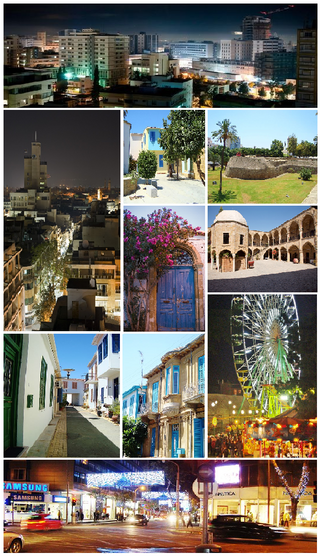
Nicosia is the capital and largest city of Cyprus. It is located near the centre of the Mesaoria plain, on the banks of the River Pedieos.
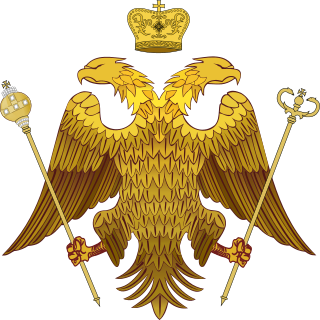
The Church of Cyprus is one of the autocephalous Greek Orthodox churches that together with other Eastern Orthodox churches form the communion of the Eastern Orthodox Church. It is one of the oldest Eastern Orthodox autocephalous churches; it claims to have always been independent, although it may have been subject to the Church of Antioch before its autocephaly was recognized in 431 at the Council of Ephesus. The bishop of the ancient capital, Salamis was constituted metropolitan by Emperor Zeno, with the title archbishop.

A state religion is a religion or creed officially endorsed by a sovereign state. A state with an official religion, while not a secular state, is not necessarily a theocracy. State religions are official or government-sanctioned establishments of a religion, but the state does not need to be under the control of the clergy, nor is the state-sanctioned religion necessarily under the control of the state.
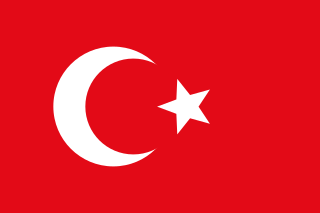
The Eyalet of Cyprus was an eyalet (province) of the Ottoman Empire made up of the island of Cyprus, which was annexed into the Empire in 1571. The Ottomans changed the way they administered Cyprus multiple times. It was a sanjak (sub-province) of the Eyalet of the Archipelago from 1670 to 1703, and again from 1784 onwards; a fief of the Grand Vizier ; and again an eyalet for the short period from 1745 to 1748.

Kyrenia District is one of the six districts of Cyprus. Its main town is Kyrenia. It is the smallest of Cyprus' districts, and is the only one controlled in its entirety by the unrecognised de facto state of Northern Cyprus, where the same territory is administered as the de facto Girne District, a distinct entity.

The Catholic Church in Cyprus is part of the worldwide Catholic Church, under the spiritual leadership of the Pope in Rome.
Human rights in Cyprus are protected by the constitution of the Republic of Cyprus.
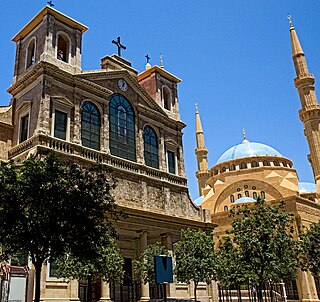
Lebanon is an eastern Mediterranean country that has the most religiously diverse society within the Middle East, comprising 18 recognized religious sects. The religions are Islam and Christianity. The Druze concern around an estimate of 5% of the citizens in Lebanon. Furthermore, outside of Lebanon, Lebanese people are mostly Christians. It is also estimated that a large proportion of its population are refugees, which affects statistics. The refugees, who mostly are of Syrian or Palestinian origin, are predominantly Sunni Muslim, but also include Christians and Shia Muslims.
Religion in Cyprus is dominated by Eastern Orthodox branch of Christianity, whose adherents make up 73% of the total population of the entire island. Most Greek Cypriots are members of the autocephalous Greek Orthodox 'Church of Cyprus'. Most Turkish Cypriots are officially Sunni Muslims. There are also Baháʼí, Catholic, Jewish, Protestant, Maronite, Armenian Apostolic, and non-religious communities in Cyprus.
The Lebanese Constitution provides for freedom of religion and creeds and the exercise of all religious rites provided that the public order is not disturbed. The Constitution declares equality of rights and duties for all citizens without discrimination or preference but establishes a balance of power among the major religious groups. The government has generally respected these rights; however, the National Pact agreement in 1943 restricted the constitutional provision for apportioning political offices according to religious affiliation. There have been periodic reports of tension between religious groups, attributable to competition for political power, and citizens continue to struggle with the legacy of the civil war that was fought along sectarian lines. Despite sectarian tensions caused by the competition for political power, the Lebanese continue to coexist.

Turkey is a secular state in accordance with Article 24 of its constitution. Secularism in Turkey derives from Mustafa Kemal Atatürk's Six Arrows: republicanism, populism, laïcité, reformism, nationalism and statism. The Turkish government imposes some restrictions on Muslims and other religious groups, as well as Muslim religious expression in government offices and state-run institutions, including universities.
The Constitution of the Republic of Cyprus provides for freedom of religion. The government of the Republic of Cyprus is the only internationally recognized government on the island, and administers two-thirds of the island.
This page list topics related to Cyprus.
Myrtou is a town in the Kyrenia District of Cyprus, north of the city of Morphou. It is under the de facto control of Northern Cyprus.
Vouno is a village in the Kyrenia District of Cyprus. De facto, it is under the control of Northern Cyprus. Its population in 2011 was 299.
This article documents the status of various religions in the limited-recognition state of Northern Cyprus. Turkish Cypriots administer approximately one-third of the island.
Human rights in Northern Cyprus are protected by the constitution of Northern Cyprus. However, there have been reports of violations of the human rights of minorities, democratic freedom, freedom from discrimination, freedom from torture, freedom of movement, freedom of religion, freedom of speech, right to education, right to life, right to property, and the rights of displaced persons. The rights of Greek Cypriots displaced by the 1974 Turkish invasion of Cyprus, notably their rights to property and right of return, is one of the focal points of ongoing negotiations for the solution of the Cyprus question.
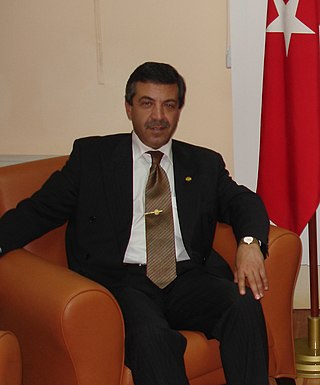
Tahsin Ertuğruloğlu is a Turkish Cypriot politician. He served as a member of the Assembly of the Republic representing the Lefkoşa District between 1998 and 2018. During this time, he was a member of the National Unity Party (UBP) between 1998 and 2010, serving as the leader of the party between 2006 and 2008. He returned to the UBP in 2012 and remained its representative until the end of his tenure as an MP. He served in different ministerial positions, including a five-year tenure as the Minister of Foreign Affairs and Defense between 1998 and 2004.

Christianity in Cyprus is the largest religion in the country, making up 78% of the island's population. The largest Christian denomination is the Greek Orthodox Church, while the rest are smaller communities of Anglicans, Roman Catholics, Latin Christians, Maronites, Armenian Apostolics, and Greek Evangelicals.
References
- ↑ The Constitution of the Turkish Republic of Northern Cyprus, Articles 23 and 30, Retrieved 2011-04-24.
- ↑ 2002 Report on Human Rights in Cyprus, US Department of State, retrieved on April 21, 2011.
- ↑ Cyprus International Religious Freedom Report 2007 - Cyprus, US Department of State, Retrieved 2011-04-24.
- ↑ Cyprus Overview (Minority Rights Group International) Retrieved April 21, 2011.
- 1 2 3 US International Religious Freedom Report 2022 - Cyprus, US Department of State, Retrieved 2023-11-23
- ↑ St Andrew's Church Kyrenia website
- ↑ Diocese of Cyprus and the Gulf website, article by Helen Perry dated 2023-04-11
- 1 2 Turkey’s Foreign Ministry Decries ‘Biased Resolution’ on N. Cyprus by Nanore Barsoumian Armenian Weekly, 7 October 2010.
- 1 2 Interruption of the Christmas mass in the northern occupied part of Cyprus by Turkish troops and restrictions to the right to freedom of religion and worship Archived 2011-02-25 at the Wayback Machine Written Declaration No. 467, Parliamentary Assembly of the Council of Europe, Doc. 12505, 27 January 2011.
- ↑ Islam fanatizmi Isa'ya yasak, Turkish translation: "Islam fanaticism, ban Jesus" Archived 2011-09-03 at the Wayback Machine , Afrika newspaper, 18 March 2011.
- 1 2 Andria Kades (24 May 2016). "Turkish Cypriot side restricts Orthodox church services in north". Cyprus Mail . Retrieved 24 May 2016.
- 1 2 "KKTC'deki kilse ayinlerine sınırlama" (in Turkish). Kıbrıs. 20 May 2016. Retrieved 23 May 2016.
- ↑ Chabad Ludavitch of North Cyprus website, retrieved 2023-11-23